Gori (Georgia) on:
[Wikipedia]
[Google]
[Amazon]
Gori ( ka, გორი ) is a city in eastern Georgia, which serves as the regional
 The territory of Gori has been populated since the early Bronze Age. According to medieval Georgian chronicles, the town of Gori was founded by King David IV (r. 1089–1125) who settled refugees from Armenia there. However, the fortress of Gori (
The territory of Gori has been populated since the early Bronze Age. According to medieval Georgian chronicles, the town of Gori was founded by King David IV (r. 1089–1125) who settled refugees from Armenia there. However, the fortress of Gori (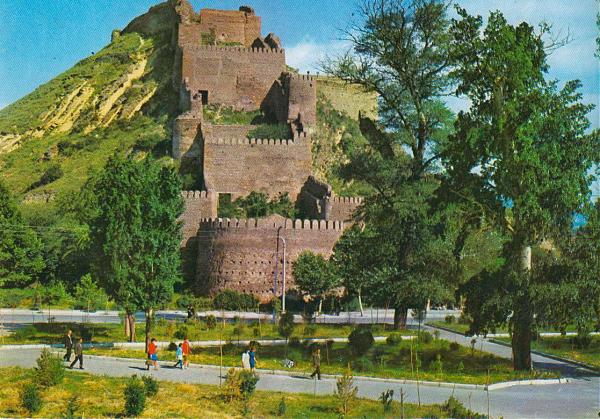 With the downfall of the medieval
With the downfall of the medieval
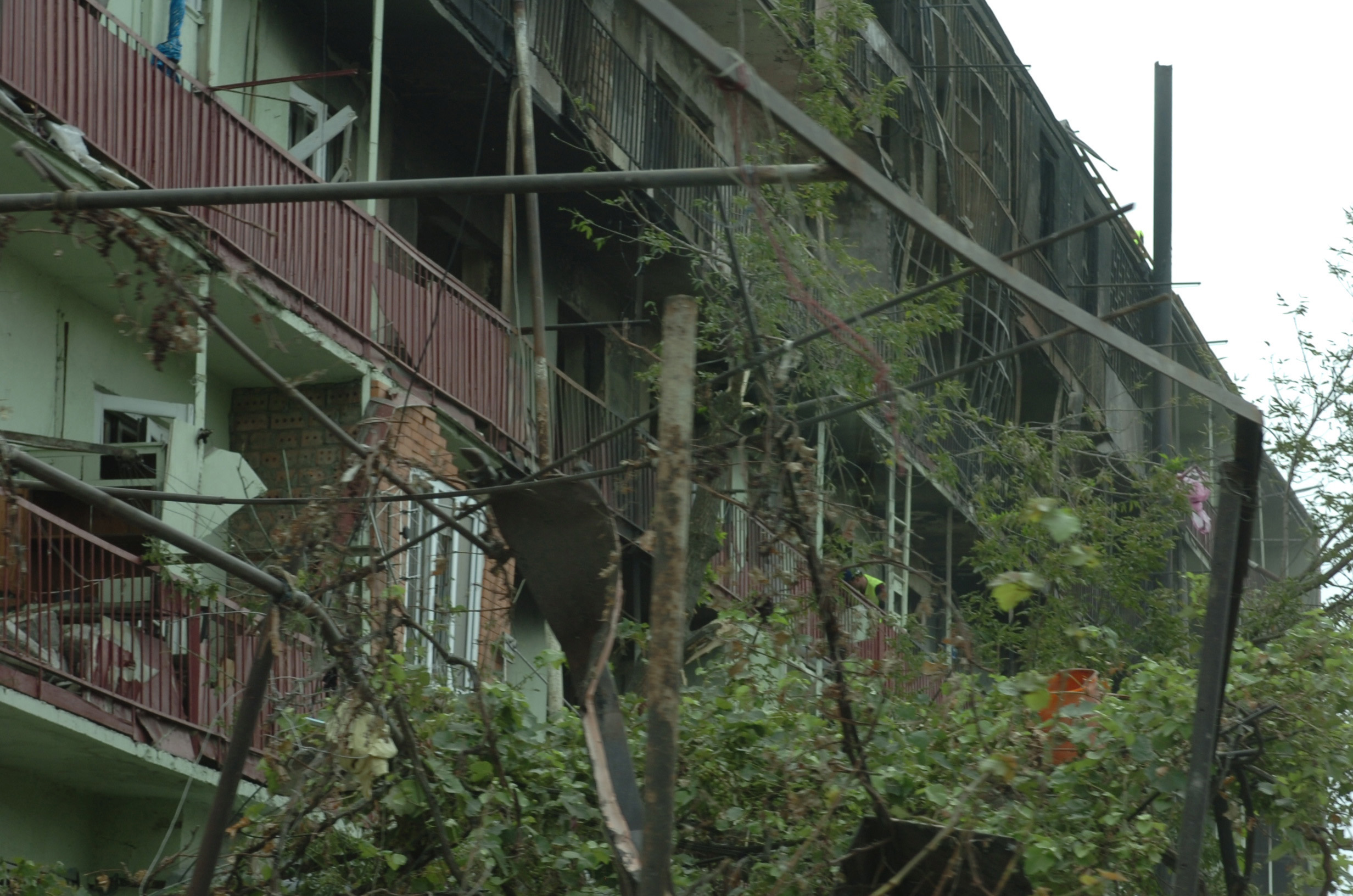 In the 2008 Russo-Georgian War, the town came under aerial attack by the
In the 2008 Russo-Georgian War, the town came under aerial attack by the
23 August 2008 The following day Units of the Georgian Army returned to Gori. However, Russian checkpoints remained near Gori as well as in so-called buffer zones near the borders with Abkhazia and South Ossetia.


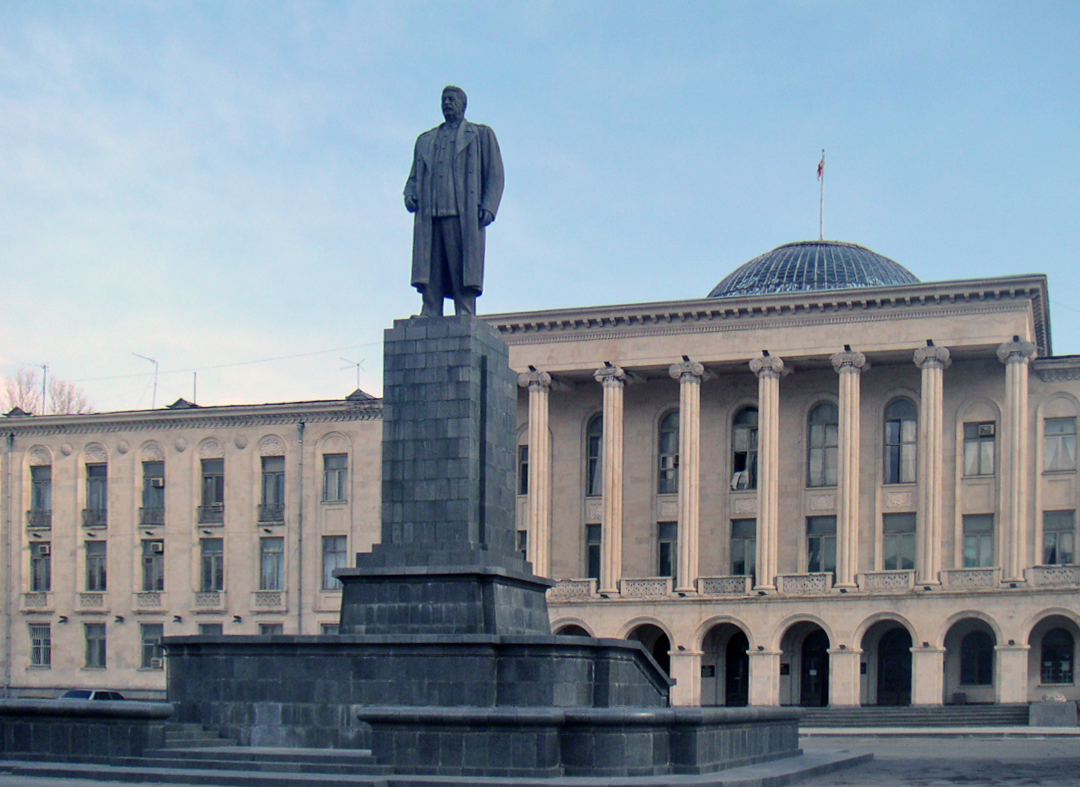
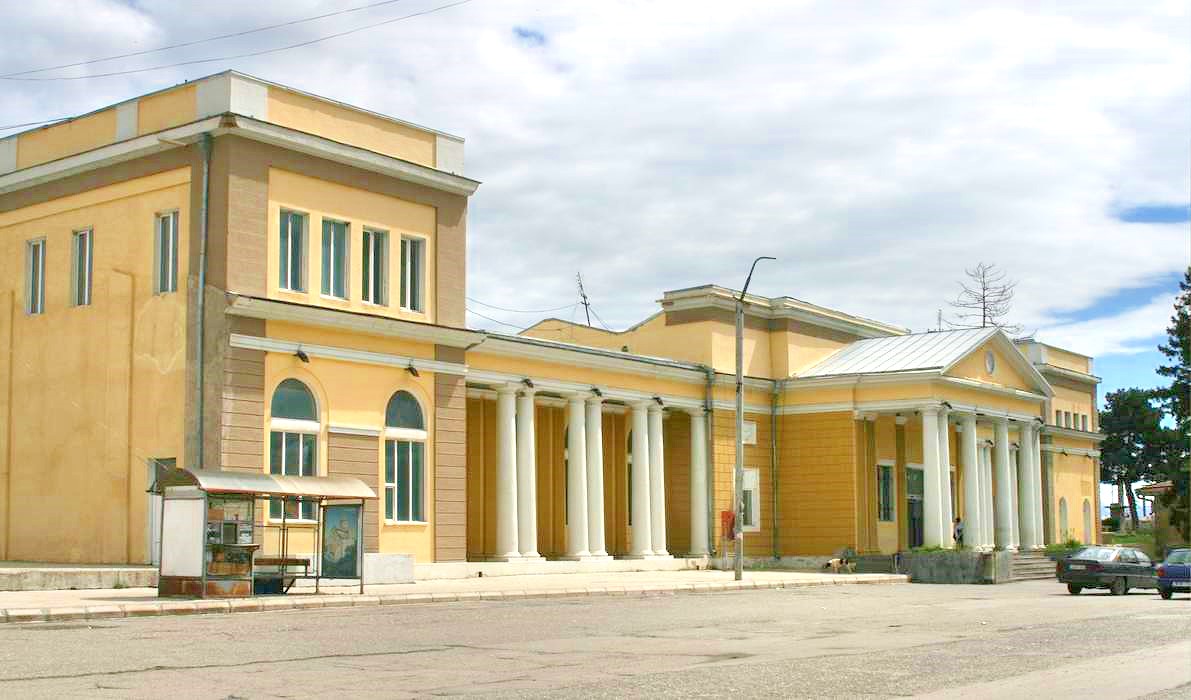

 Gori and its environs house several notable cultural and historical landmarks. Although for many foreigners Gori is principally known as the birthplace of Joseph Stalin, in Georgian historical memory the city has long been associated with its citadel, the
Gori and its environs house several notable cultural and historical landmarks. Although for many foreigners Gori is principally known as the birthplace of Joseph Stalin, in Georgian historical memory the city has long been associated with its citadel, the
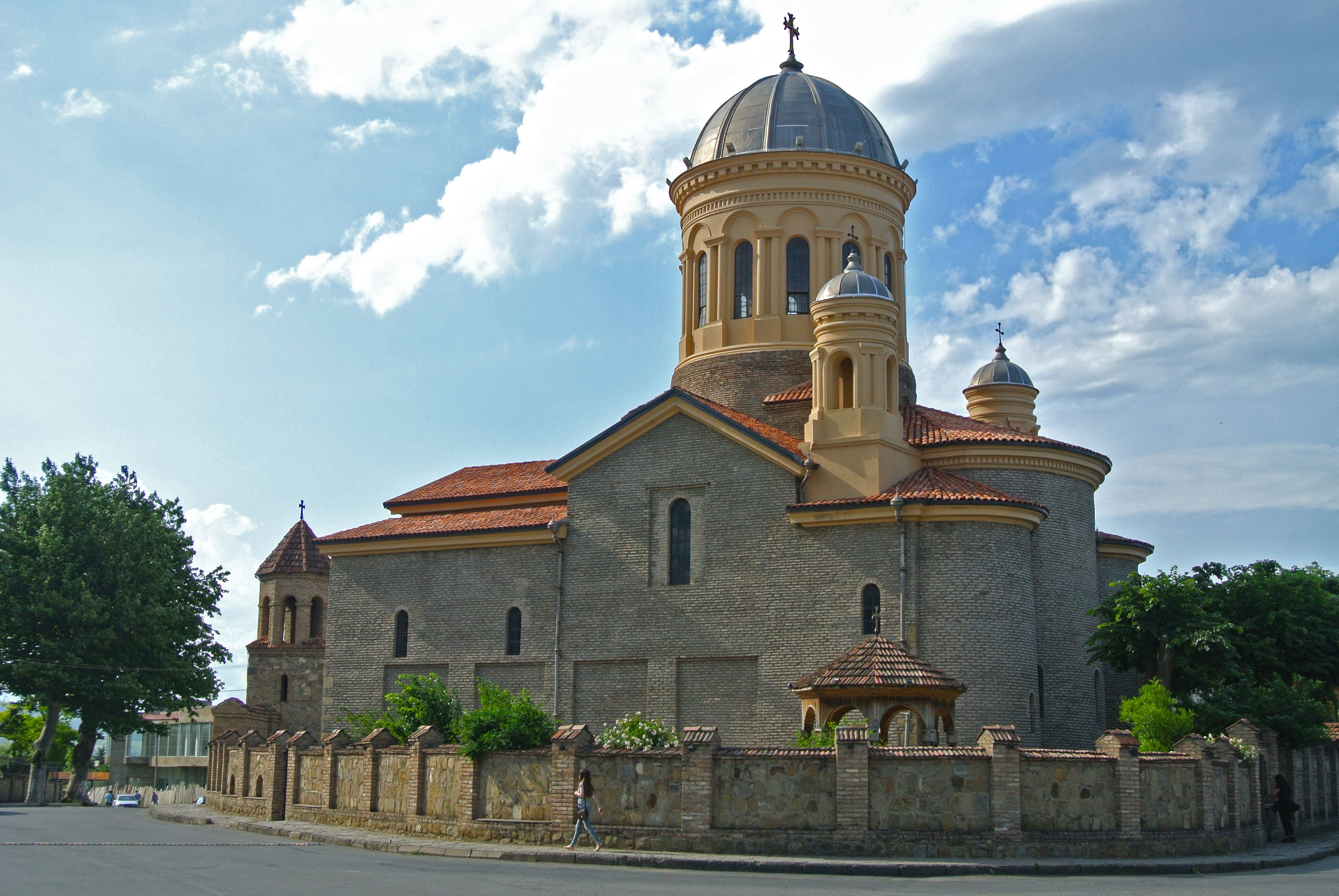
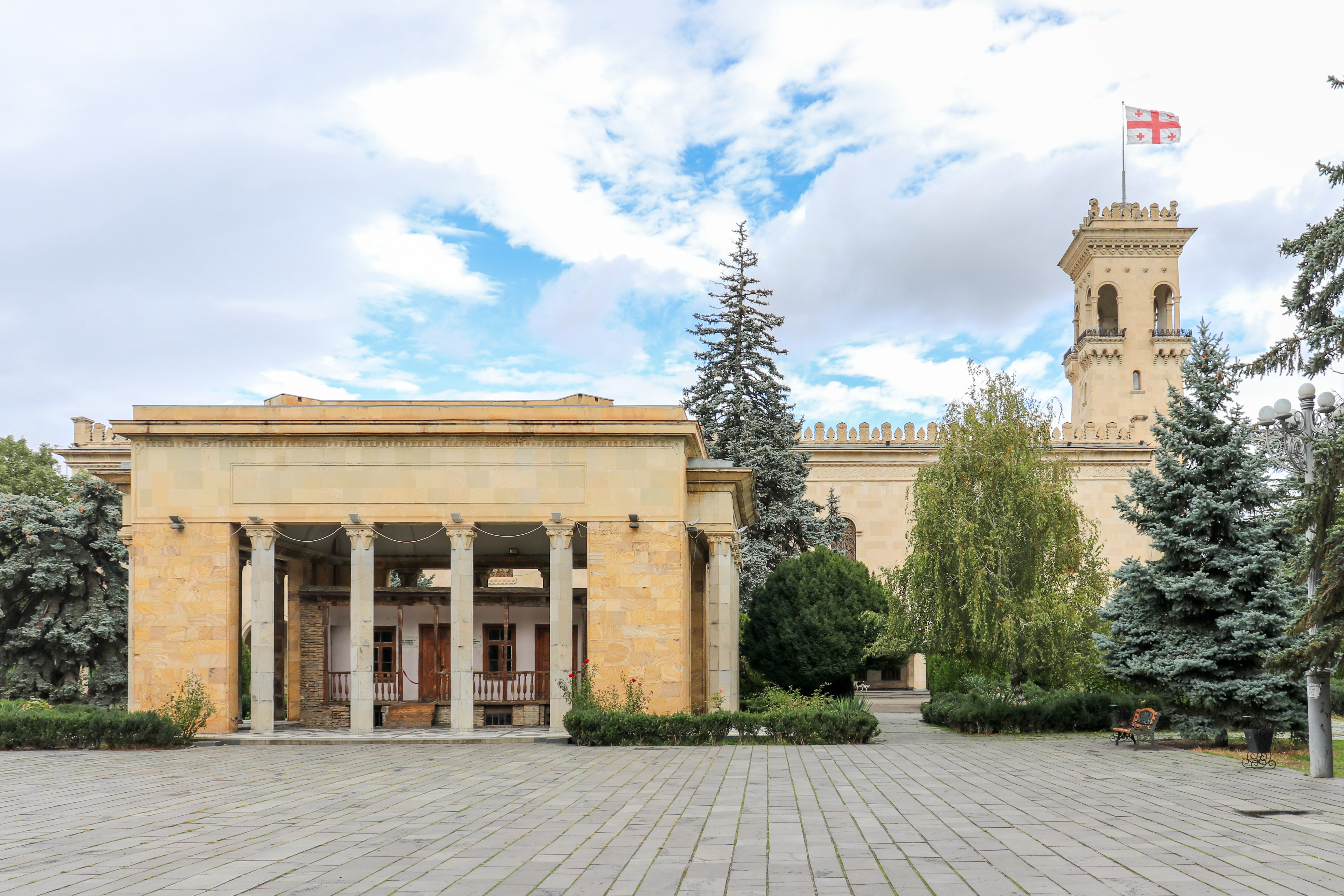 *
*
Official SiteMap of GoriLive Web Cam
{{Authority control Tiflis Governorate
capital
Capital may refer to:
Common uses
* Capital city, a municipality of primary status
** List of national capital cities
* Capital letter, an upper-case letter Economics and social sciences
* Capital (economics), the durable produced goods used f ...
of Shida Kartli and is located at the confluence of two rivers, the Mtkvari and the Liakhvi. Gori is the fifth most populous city in Georgia. Its name comes from the Georgian word ''gora'' (გორა), meaning "heap", "hill", or "mountain".
A settlement known here from the Hellenistic period, with the Gori Fortress
Gori Fortress ( ka, გორის ციხე, "Goris Tsikhe") is a medieval citadel in Georgia, situated above the city of Gori on a rocky hill.
Standing on the hilltop, the fortress's outlines follow the natural relief, hence the irregular ...
built at least in 7th century, it received town status in the 12th century. Gori was an important military stronghold in the Middle Ages and maintains a strategic importance due to its location on the principal highway connecting eastern and western parts of Georgia. In the course of its history, Gori has been invaded by the armies of regional powers several times. The city was occupied by Russian troops during the 2008 Russo–Georgian War.
Gori is also known as the birthplace of the Soviet leader and politician Joseph Stalin, ballistic missile designer Aleksandr Nadiradze, and philosopher Merab Mamardashvili.
Geography and climate
Gori is located west of Georgia's capital Tbilisi, at the confluence of the rivers Mtkvari and Greater Liakhvi,above sea level
Height above mean sea level is a measure of the vertical distance (height, elevation or altitude) of a location in reference to a historic mean sea level taken as a vertical datum. In geodesy, it is formalized as ''orthometric heights''.
The comb ...
. The climate is humid continental, transitional from moderately warm steppe to moderately humid. Summer is usually hot. The average annual temperature is , minimal in January () and maximal in July and August (). The maximum precipitation falls in May () and minimum in February (). Precipitation here averages 603 mm.
History
 The territory of Gori has been populated since the early Bronze Age. According to medieval Georgian chronicles, the town of Gori was founded by King David IV (r. 1089–1125) who settled refugees from Armenia there. However, the fortress of Gori (
The territory of Gori has been populated since the early Bronze Age. According to medieval Georgian chronicles, the town of Gori was founded by King David IV (r. 1089–1125) who settled refugees from Armenia there. However, the fortress of Gori (Goris-Tsikhe
Gori Fortress ( ka, გორის ციხე, "Goris Tsikhe") is a medieval citadel in Georgia, situated above the city of Gori on a rocky hill.
Standing on the hilltop, the fortress's outlines follow the natural relief, hence the irregular ...
) appears to have been in use already in the 7th century, and archaeological evidence indicates the existence of an urban community in Classical Antiquity. In 1299, Gori was captured by the Alan
Alan may refer to:
People
*Alan (surname), an English and Turkish surname
* Alan (given name), an English given name
**List of people with given name Alan
''Following are people commonly referred to solely by "Alan" or by a homonymous name.''
*A ...
tribesmen fleeing the Mongol conquest of their original homeland in the North Caucasus. The Georgian king George V recovered the town in 1320, pushing the Alans back over the Caucasus mountains.
 With the downfall of the medieval
With the downfall of the medieval Georgian kingdom
The Kingdom of Georgia ( ka, საქართველოს სამეფო, tr), also known as the Georgian Empire, was a medieval Eurasian monarchy that was founded in circa 1008 AD. It reached its Golden Age of political and economic ...
, Gori – strategically located at the crossroads of major transit routes – was frequently targeted by foreign invaders, and changed its masters on several occasions. It was first taken and sacked by Uzun Hassan
Uzun Hasan or Uzun Hassan ( اوزون حسن; fa, اوزون حسن; 1423 – January 6, 1478; where ''uzun'' means "tall" in Oghuz Turkic) was a ruler of the Turkoman Aq Qoyunlu state and is generally considered to be its strongest ruler. Ha ...
of the Ak Koyunlu
The Aq Qoyunlu ( az, Ağqoyunlular , ) was a culturally Persianate,Kaushik Roy, ''Military Transition in Early Modern Asia, 1400–1750'', (Bloomsbury, 2014), 38; "Post-Mongol Persia and Iraq were ruled by two tribal confederations: Akkoyunlu (Wh ...
in 1477, followed by Tahmasp I of Persia in the mid-16th century. By the end of that century, Gori briefly passed to the Ottomans
The Ottoman Turks ( tr, Osmanlı Türkleri), were the Turkic founding and sociopolitically the most dominant ethnic group of the Ottoman Empire ( 1299/1302–1922).
Reliable information about the early history of Ottoman Turks remains scarce, ...
through the 1578–90 Ottoman–Persian War, and became their major outpost in Georgia until being recovered by the Georgians under Simon I of Kartli after heavy fighting in 1599. The town was once again garrisoned by the Persians under Shah Abbas I in 1614. Following successive occupations by the Ottomans (1723–35) and Persians (1735–40s), Gori returned to Georgian control under the kings Teimuraz II and Erekle II whose efforts helped to advance economy and culture in the town. Following the Russian annexation of Georgia, Gori was granted the status of a town within the Gori Uyezd
The Gori uezd was a county (''uezd'') of the Tiflis Governorate of the Caucasus Viceroyalty of the Russian Empire, and then of Democratic Republic of Georgia, with its administrative center in Gori.Brockhaus and Efron EncyclopaediaTiflis Governor ...
of the Tiflis Governorate in 1801. It grew in size and population throughout the 19th century. A plan of 1824 shows the town on the hill slopes below the citadel, and a mote around it. The town was destroyed in the 1920 earthquake, and almost completely rebuilt in the Soviet period. An important industrial center in Soviet times, Gori suffered from an economic collapse and the outflow of the population during the years of a post-Soviet crisis of the 1990s.
Gori is close to the Georgian–Ossetian conflict
The Georgian–Ossetian conflict is an ethno-political conflict over Georgia's former autonomous region of South Ossetia, which evolved in 1989 and developed into a war. Despite a declared ceasefire and numerous peace efforts, the conflict r ...
zone. It is connected to breakaway South Ossetia's capital Tskhinvali via a railroad spur which has been defunct since the early 1990s. Since the 2000s, Georgia has increased the military infrastructure in and around the city. Thus, the Central Military Hospital
Central is an adjective usually referring to being in the center of some place or (mathematical) object.
Central may also refer to:
Directions and generalised locations
* Central Africa, a region in the centre of Africa continent, also known a ...
was relocated from Tbilisi to Gori and re-equipped in October 2006. On January 18, 2008, Georgia's second NATO-standard base to accommodate the 1st Infantry Brigade (Georgia) of the Georgian Ground Forces
The Georgian Land Forces ( ka, საქართველოს სახმელეთო ძალები) are the land force component of the Defense Forces of Georgia. They are the largest branch of the military and constitute the bulk o ...
was established at Gori. The Georgian Agrarian Science Academy Branch was established in the city in 1995; this became Sukhishvili University
Sukhishvili University is an accredited, independent private university under Georgia's national accreditation scheme by the National Center for Educational Accreditation (replaced by the National Center for Educational Quality Enhancement in 201 ...
in 2003.
2008 conflict
 In the 2008 Russo-Georgian War, the town came under aerial attack by the
In the 2008 Russo-Georgian War, the town came under aerial attack by the Russian Air Force
" Air March"
, mascot =
, anniversaries = 12 August
, equipment =
, equipment_label =
, battles =
, decorations =
, bat ...
from the outset of the conflict. Military targets and residential districts of Gori were hit by the airstrikes, resulting in civilian injuries and deaths. Human Rights Watch (HRW) claimed that Russian forces had indiscriminately deployed cluster bombs in civilian areas around Gori. According to HRW, on August 12 Russian forces dropped cluster bombs in the center of Gori, killing 11 civilians and wounding dozens more. Russian military officials deny using cluster munitions in the conflict, calling the HRW assertion "slanderous" and questioning the HRW's objectivity. Numerous unexploded "bomblets" have been found by locals and HRW employees.
By August 11, Georgian military personnel, government, and most residents had fled the city, which was then captured and occupied by the Russian military and South Ossetian separatist militia. HRW accused the militia of unleashing a campaign of looting
Looting is the act of stealing, or the taking of goods by force, typically in the midst of a military, political, or other social crisis, such as war, natural disasters (where law and civil enforcement are temporarily ineffective), or rioting. ...
, arson
Arson is the crime of willfully and deliberately setting fire to or charring property. Although the act of arson typically involves buildings, the term can also refer to the intentional burning of other things, such as motor vehicles, wat ...
, kidnapping
In criminal law, kidnapping is the unlawful confinement of a person against their will, often including transportation/asportation. The asportation and abduction element is typically but not necessarily conducted by means of force or fear: the p ...
and other attacks against the remaining civilian population. The Russian and South Ossetian forces withdrew from the city on August 22, 2008.Civil Georgia: "Police Back in Gori"23 August 2008 The following day Units of the Georgian Army returned to Gori. However, Russian checkpoints remained near Gori as well as in so-called buffer zones near the borders with Abkhazia and South Ossetia.
Demographics


Landmarks


 Gori and its environs house several notable cultural and historical landmarks. Although for many foreigners Gori is principally known as the birthplace of Joseph Stalin, in Georgian historical memory the city has long been associated with its citadel, the
Gori and its environs house several notable cultural and historical landmarks. Although for many foreigners Gori is principally known as the birthplace of Joseph Stalin, in Georgian historical memory the city has long been associated with its citadel, the Gori Fortress
Gori Fortress ( ka, გორის ციხე, "Goris Tsikhe") is a medieval citadel in Georgia, situated above the city of Gori on a rocky hill.
Standing on the hilltop, the fortress's outlines follow the natural relief, hence the irregular ...
, which is built on a cliffy hill overlooking the central part of the modern city. On another hill stands the 18th century St. George
Saint George (Greek: Γεώργιος (Geórgios), Latin: Georgius, Arabic: القديس جرجس; died 23 April 303), also George of Lydda, was a Christian who is venerated as a saint in Christianity. According to tradition he was a soldier ...
's church of Gorijvari, a popular place of pilgrimage. The famous ancient rock-hewn town of Uplistsikhe and the 7th century Ateni Sioni Church
The Ateni Sioni Church ( ka, ატენის სიონი) is an early 7th-century Georgian Orthodox church in the village of Ateni, some south of the city of Gori, Georgia. It stands in a setting of Ateni gorge in the Tana River valley ...
are located not far from Gori.
Stalin's association with the city is emphasized by the Joseph Stalin Museum in downtown Gori and, until recently, the Stalin monument in front of the Gori City Hall
Gori City Hall ( ka, გორის მერია, ''goris meria'') is an administrative building of Gori, Georgia, a city in eastern Georgia, which serves as the regional capital of Shida Kartli. History
According to media reports, the ha ...
, one of the few such monuments to survive Nikita Khrushchev's de-Stalinization
De-Stalinization (russian: десталинизация, translit=destalinizatsiya) comprised a series of political reforms in the Soviet Union after the death of long-time leader Joseph Stalin in 1953, and the thaw brought about by ascension ...
program. The monument was a source of controversy in a newly independent Georgia in the 1990s, but for several years the post-communist government acceded to the Gori citizens' request and left the statue untouched. It was ultimately removed on June 25, 2010. However, on 20 December 2012, the municipal assembly of Gori voted to reinstate the monument.
Administrative divisions
The city is divided into 11 administrative districts, they are:Notable people
*Anastasia Eristavi-Khoshtaria
Anastasia Eristavi-Khoshtaria
Anastasia Eristavi-Khoshtaria ( ka, ანასტასია ერისთავი-ხოშტარია) (February 3, 1868 – May 1, 1951) was a Georgian woman novelist.
Biography
She was born into an aris ...
(1868-1951), novelist
* Joseph Stalin (1878–1953), Soviet leader
* Simon Arshaki Ter-Petrosian (1882–1922), revolutionary
*Vano Muradeli
Vano Muradeli ( ka, ვანო მურადელი; russian: Вано Ильич Мурадели; in Gori – 14 August 1970, in Tomsk), was a Soviet Georgian composer.
He was born in Gori, Georgia (then part of Imperial Russia) t ...
(1908–1970), composer
*Aleksandre Machavariani
Aleksandre "Aleksi" Machavariani ( ka, ალექსი მაჭავარიანი) (23 September 1913 – 30 December 1995) was a Georgian composer and conductor.
Aleksi Machavariani was born in Gori, Georgia. He graduated from the T ...
(1913–1995), composer
* Aleksandr Nadiradze (1914–1987), inventor
* Edvard Mirzoyan (1921–2012), composer
*Sulkhan Tsintsadze
Sulkhan Fyodorovich Tsintsadze ( ka, სულხან ცინცაძე), (August 23, 1925 in Gori, Transcaucasian SSR, Soviet Union – September 15, 1991 in Tbilisi, Georgia) was one of Georgia's foremost composers.
Education
Tsin ...
(1925–1991), composer
* Merab Mamardashvili (1930–1990), philosopher
*Giorgi Tenadze
Giorgi Tenadze ( ka, გიორგი თენაძე) (born 24 May 1962 in Gori) is a Georgian judoka who competed for the Soviet Union in the 1988 Summer Olympics
The 1988 Summer Olympics (), officially known as the Games of the X ...
(born 1962), wrestler
*Vazha Tarkhnishvili
Vazha Tarkhnishvili ( ka, ვაჟა თარხნიშვილი; born 25 August 1971 in Gori) is a retired Georgian–Moldovan footballer who played his last 13 years of activity as a defender for the Moldovan National Division club She ...
(born 1971), footballer
*Georgi Kandelaki
Georgi Kandelaki ( ka, გიორგი კანდელაკი; born April 10, 1974 in Variani, Georgian Soviet Socialist Republic, Soviet Union) is a retired Georgian boxer of Caucasus Greek descent, and current boxing administrator. He ...
(born 1974), boxer
*Lasha Shavdatuashvili
Lasha Shavdatuashvili ( ka, ლაშა შავდათუაშვილი; born 31 January 1992) is a Georgian judoka. Shavdatuashvili is one of the most successful judoka of the early 21st century, having won Olympic medals at the 2012, ...
(born 1992), wrestler
*Geno Petriashvili
Geno Petriashvili (გენო პეტრიაშვილი; born 1 April 1994) is a Georgian heavyweight freestyle wrestler. He is European champion in 2016 and 2020 and world champion in 2017, 2018 and 2019, as well as a bronze medal at t ...
(born 1994), wrestler
* Oto Nemsadze (born 1989), singer
* Vladimer Khinchegashvili (born 1991), wrestler, Olympic & World Champion
Important sights
 *
* Gori Fortress
Gori Fortress ( ka, გორის ციხე, "Goris Tsikhe") is a medieval citadel in Georgia, situated above the city of Gori on a rocky hill.
Standing on the hilltop, the fortress's outlines follow the natural relief, hence the irregular ...
* Gori Cathedral of Saint Mary
* Gori State Historical-Ethnographic Museum
* Joseph Stalin State Museum
* House of Amilakhvris
* Monument to Nikoloz Baratashvili
Prince Nikoloz "Tato" Baratashvili ( ka, ნიკოლოზ "ტატო" ბარათაშვილი; 4 December 1817 – 21 October 1845) was a Georgian poet. He was one of the first Georgians to marry modern nationalism with European R ...
* Monument to Iakob Gogebashvili
* Gori Pedagogical Institute
* Gori State Drama Theater
* Gori State Historical-Ethnographic Museum
* Gorijvari
* Erekle Baths
* Monument to Giorgi Eristavi
Giorgi Eristavi ( ka, გიორგი ერისთავი) (1813 – September 9, 1864) was a Georgian playwright, poet, journalist, and the founder of modern Georgian theatre.
Prince Giorgi Eristavi was born in the village of Odzisi (near ...
* Monument to Nico Lomouri
* Military city
* Theological School
References
External links
Official Site
{{Authority control Tiflis Governorate